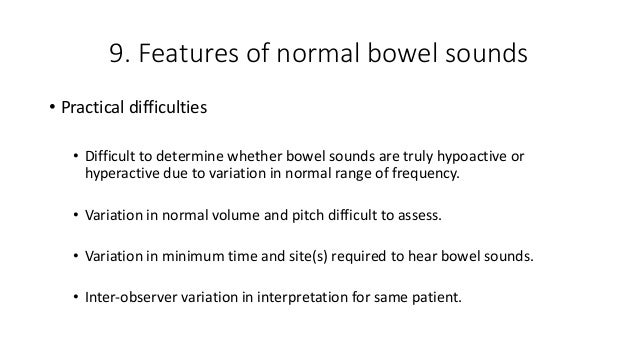
Describing Bowel Sounds. Most bowel sounds are normal. Perform auscultation of bowel sounds in all four quadrants. From the general practice to the icu listening to lung sounds can tell you a great deal about a patient and their relative health. This produces the rumbling bowel sound which is also known as borborygmus.

Describe normo hypo and hyperactive bowel sounds starting in the rlq that is where the small intestine and large intestine meet and where bowel sounds might be most active i would use the diaphragm of stethoscope press firmly for diaphragm and listen for 1 min. Wave like muscle contractions known as peristaltic movement is responsible for moving foods and gases through the digestive tract. Bowel and abdominal sounds of course. Auscultating bowel sounds can allow you to pinpoint areas where an obstruction may have occurred. The intestines are hollow so bowel sounds echo through the abdomen much like the sounds heard from water pipes. Perform auscultation of bowel sounds in all four quadrants.
From the general practice to the icu listening to lung sounds can tell you a great deal about a patient and their relative health.
Wave like muscle contractions known as peristaltic movement is responsible for moving foods and gases through the digestive tract. Bowel sounds are normal. Wave like muscle contractions known as peristaltic movement is responsible for moving foods and gases through the digestive tract. Absent bowel sounds may indicate ileus or peritonitis. Bowel sounds become much louder if there is any intestinal obstruction and are abolished in the condition of paralytic ileus. Hypoactive bowel sounds are considered as one every three to five minutes and this can indicate diarrhoea anxiety or gastroenteritis.